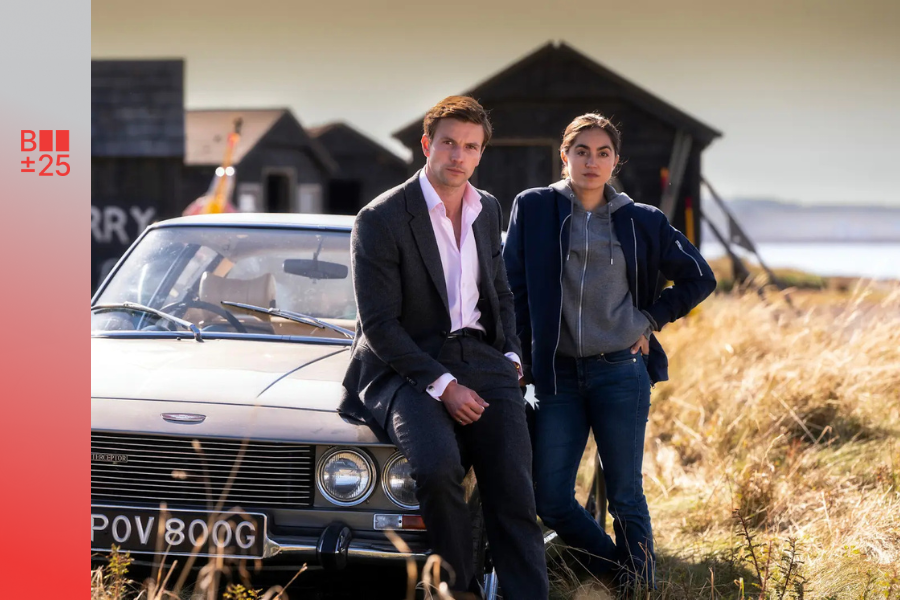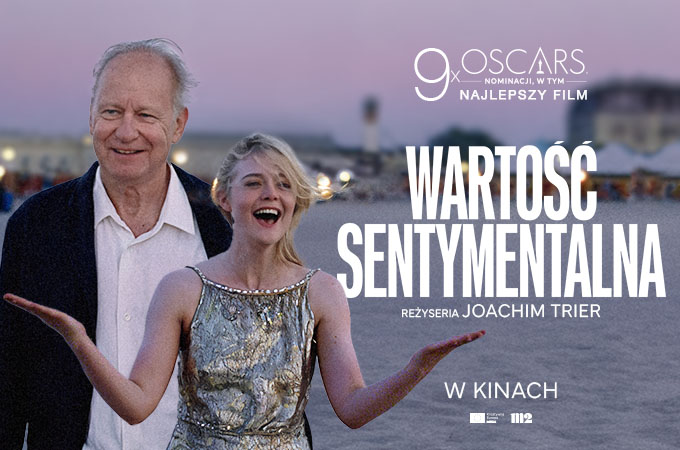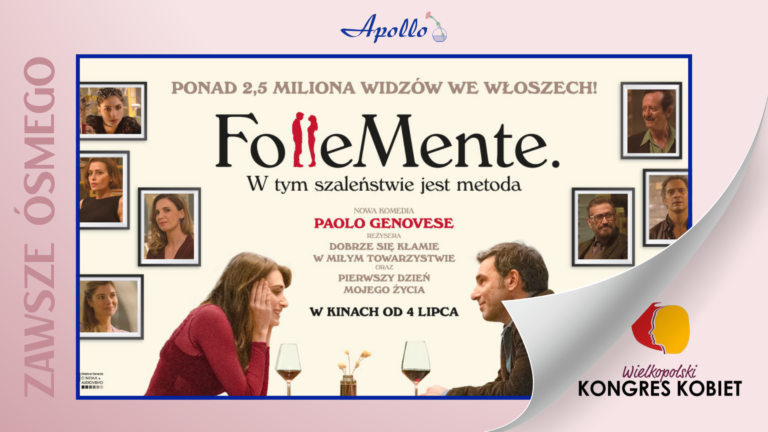

PL
Efekt wyjątkowej współpracy British Film Festival i BBC Studios: specjalny, przedpremierowy pokaz dwóch pierwszych odcinków serialu kryminalnego opartego na bestsellerowych powieściach Elizabeth George.
Zanim produkcja trafi na platformy VOD, widzowie festiwalu jako pierwsi w Polsce będą mieli okazję zobaczyć jej początek na dużym ekranie. Decyzja o kinowej prezentacji nie jest przypadkowa – najlepsze produkcje BBC Studios od dawna charakteryzuje jakość, wizualna i narracyjna, która w pełni wybrzmiewa właśnie w warunkach kinowych.
Centralnym punktem serialu jest dynamiczna relacja dwojga detektywów ze Scotland Yardu, którzy pochodzą z zupełnie różnych środowisk. Inspektor Thomas Lynley to arystokrata i absolwent Oksfordu, poruszający się swobodnie w świecie brytyjskich wyższych sfer. Nową partnerką Lynleya zostaje sierżant Barbara Havers – jego całkowity kontrast. To pragmatyczna, wywodząca się z klasy robotniczej policjantka, która wszystko, co osiągnęła, zawdzięcza własnej pracy i uporowi.
Ten pozornie niedobrany duet musi nauczyć się współpracy, by rozwiązywać skomplikowane sprawy morderstw, które prowadzą ich przez malownicze, lecz pełne mrocznych sekretów zakątki Wysp. To właśnie napięcie – między eleganckim światem Lynleya a szorstką rzeczywistością policyjnej pracy Havers – tworzy fundament serialu i sprawia, że jest on czymś więcej niż standardową opowieścią kryminalną. To inteligentna rozrywka i starannie zarysowany portret społecznych podziałów, z którymi Wielka Brytania mierzy się od lat.
ENG
Here’s the result of an exceptional collaboration between the British Film Festival and BBC Studios: a special pre-premiere screening of the first two episodes of a brand-new crime series based on the bestselling novels by Elizabeth George.
Before its official release on streaming platforms, festival audiences will be the first in Poland to experience its gripping opening on the big screen. The decision to present it in cinemas is no coincidence – BBC Studios’ finest productions have long been distinguished by a visual and narrative quality that truly comes alive in a theatrical setting.
At the heart of the series lies the dynamic relationship between two Scotland Yard detectives from utterly different worlds. Inspector Thomas Lynley is an aristocrat and Oxford graduate, perfectly at ease among Britain’s upper classes. His new partner, Sergeant Barbara Havers, is his complete opposite: she is a working-class officer who has earned every success through sheer grit and determination.
This seemingly mismatched duo must learn to work together to solve complex murder cases that lead them through Britain’s most picturesque yet secret-filled corners. The tension between Lynley’s refined world and Havers’s rough-and-ready policing is what gives the series its edge, elevating it far beyond the conventions of the genre. Intelligent, stylish, and socially aware, LYNLEY offers both gripping entertainment and a sharp portrait of the class divides that continue to shape modern Britain.
Nominowany do dziewięciu Oscarów najnowszy film Joachima Triera, reżysera „Najgorszego człowieka na świecie”, z nominowanymi do Oscara w kategoriach aktorskich Renate Reinsve, Stellanem Skarsgårdem, Ingą Ibsdotter Lilleaas i Elle Fanning w rolach głównych. Jeden z najczęściej nagradzanych i najważniejszych filmów tego roku, z muzyką skomponowaną przez polską kompozytorkę Hanię Rani.
Siostry Nora (Renate Reinsve) i Agnes (Inga Ibsdotter Lilleaas) spotykają się ze swoim dawno niewidzianym ojcem, charyzmatycznym, niegdyś wielkim reżyserem filmowym Gustavem (Stellan Skarsgård). Proponuje on Norze, aktorce teatralnej, rolę w swoim najnowszym filmie, który ma być jego powrotem do świata filmu. Gdy dziewczyna odrzuca propozycję, ten zatrudnia młodą gwiazdę Hollywood (Elle Fanning). Teraz siostry muszą poradzić sobie nie tylko ze swoją skomplikowaną sytuacją z ojcem, ale też z amerykańską gwiazdą, która zmienia ich rodzinną dynamikę.
Poruszająca i pełna humoru opowieść, która złamie serce, zanim znów je poskłada - Elle
tytuł oryginalny: Affeksjonsverdi
reżyseria: Joachim Trier
Ta historia sprawi, że nabierzecie wiatru w żagle! Dziewczyny z „Maiden” mają wyjątkowy dar przekonywania, że w życiu da się pokonać wszelkie uprzedzenia i przesunąć każde granice. Trzymający w napięciu jak dreszczowiec, ten znakomity dokument jest opowieścią o kobietach, które chciały całego życia. O ich determinacji, sile i marzeniach, których nie zatrzymała potężna fala niechęci.
W 1989 roku grupa upartych, odważnych, niezależnych dziewczyn stworzyła pierwszą w historii kobiecą załogę startującą w super prestiżowych i ekstremalnie niebezpiecznych regatach Whitbread Round the World Race. Zgromadziła je na jachcie „Maiden” Tracy Edwards: buntowniczka i uciekinierka z domu. „Dziewczyny na morzu to same problemy”. „Dziewczyny na statkach nadają się wyłącznie do kuchni” – słyszała od początku swojej wielkiej przygody z żeglowaniem. Walczyła więc nie tylko z groźnym żywiołem, ale także z lekceważeniem i pogardą. „Gdybym uwierzyła w to, co o mnie mówili, nigdy nie byłabym tu, gdzie jestem” – mówi po latach. „Nie chciałyśmy zwykłej pracy, tylko przygody!” – dodają jej koleżanki. Fascynujące biografie kobiet, które przetarły szlak kolejnym pokoleniom buntowniczek, z pewnością zainspirują współczesne poszukiwaczki przygód: dzielne córki i odważne matki.
Pasjonujący, emocjonujący, jak najlepsza sportowa rozgrywka; a przy tym dostarczający potężnej dawki wzruszeń, film „Maiden” Alexa Holmesa dowodzi, że dla Tracy Edwards i pozostałych dziewczyn był to naprawdę wyścig o wszystko: o szacunek, uznanie, o należne kobietom miejsce – nie tylko w sporcie. Przeciwnikiem groźniejszym od oceanu (który stale “próbuje cię zabić”), są bowiem wszyscy ci, którzy wmawiają kobietom, że nie potrafią, że nie dadzą rady, że się nie nadają. A ocean? Dla kobiet jest po prostu wolnością.
„Poprzednie życie" to love story, która z lekkością i wdziękiem definiuje na nowo zasady ekranowego romansu, rozkochując w sobie widzów Sundance, Berlinale i fanów studia A24. To na wskroś współczesny film, który goi złamane serca, daje szansę miłości, godzi przeszłość z przyszłością, uczy rozstawać się bez gniewu i z nadzieją na nowy początek. Dokonuje przy tym niemożliwego: sprawia, że zakochacie się w każdym z trojga bohaterów.
In-Yun to koreańskie przekonanie, że ludzie zbliżają się do siebie, bo ich dusze poznały się w poprzednich wcieleniach. Nora (Greta Lee) i Hae Sung (Teo Yoo) dorastali razem w Korei Południowej. Rozdzieleni przez los jako dzieci, odnajdują się po latach dzięki mediom społecznościowym. W końcu miłosna i migrancka odyseja zaprowadzi oboje do Nowego Jorku. Nora jest już wtedy mężatką, a Hae Sung świeżo upieczonym singlem. „Co by było, gdyby?" – to pytanie nie przestaje kołatać w ich głowach. A także w głowie męża Nory (John Magaro), zaskoczonego nagłą wizytą Koreańczyka. „Poprzednie życie" przywołuje ducha trylogii Richarda Linklatera i najlepszych nowojorskich opowieści filmowych. Historii rozpiętej między Nowym Jorkiem i Seulem, nowoczesną technologią i upragnionym dotykiem, wspomnieniami i teraźniejszością, towarzyszą echa buddyjskiej refleksji nad przeznaczeniem i duchowym wymiarem relacji.
Co kryje się w naszych myślach? Kto tak naprawdę mieszka w naszej głowie? Osoba szalona, romantyczna, namiętna, rozważna? A może w naszym umyśle panuje niezły tłok? O międzyludzkich relacjach oraz o tym, co w nas siedzi, w swoim nowym filmie opowiada twórca wielkiego hitu „Dobrze się kłamie w miłym towarzystwie” Paolo Genovese.
Bohaterami filmu są Piero i Lara. Ich pierwsza randka wywołuje u obojga zrozumiały stres. Oboje chcieliby pokazać się z jak najlepszej strony i uniknąć wpadek, o które w zdenerwowaniu nie trudno, ale też i poznać myśli i wyczuć pragnienia drugiej osoby.



